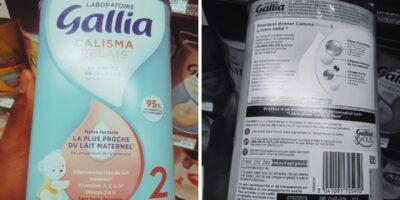A representative of Hyde Park in the United States alleges that the corn flakes brand is being manufactured in Haiti without authorization. The matter is now at the center of a legal dispute
Lire cette enquête en français
Hyde Park is likely the most popular corn flakes brand in Haiti.
But some consumers say the taste has changed. « It was better before, they changed it, » wrote a user named “BiBiepriv” on TikTok last December.
In Haitian supermarkets, the product still displays the American flag and looks similar to versions found in Walmart or on Amazon in the U.S.—with at least one notable difference: the box sold in Haiti lists Port-au-Prince as the place of production but does not name the factory.

Photo of the two Hyde Park Corn Flakes boxes.
In emails exchanged with AyiboPost, a Hyde Park representative in the U.S. referred to the product in Haiti as “fake production.”
Local producers dispute this claim.
The company Caribbean Food Manufacturing (CFM), led by entrepreneur John Batroni, has been producing Hyde Park in Haiti “for more than a decade without any objection,” according to its legal representative, attorney Yvan Richard Maurasse.
The attorney did not respond to a question about whether there was a formal agreement between the American Hyde Park brand and CFM. “If they registered the brand, they need to submit the registration,” said Mr. Maurasse.
The case is pending in court, but the Hyde Park representative in the U.S. claims no production or distribution rights were ever granted to Caribbean Food Manufacturing. If CFM is producing the cereal, he says, it would be “illegal,” adding that legal action could follow—without giving further details.
The conflict traces back to a funeral.
Jerry Martino, the businessman who originally registered Hyde Park in Haiti as early as 2004, died in 2020.
Before his death, he is said to have transferred the brand to a man named Gamal Mildor, who then passed it on to entrepreneur Guy-Michel Clérié of Safi Trading S.A.
In an email to AyiboPost, the U.S. Hyde Park representative claims Martino was granted the right to register the brand. Before his death, Martino had allegedly stopped purchasing the product due to price increases. The representative names Guy-Michel Clérié as Hyde Park’s exclusive distributor in Haiti, saying he took over after Martino’s death, and “everything is in order.”
In emails exchanged with AyiboPost, a Hyde Park representative in the U.S. referred to the product in Haiti as “fake production.”
The legal affairs office of Haiti’s Ministry of Commerce and Industry says it recognizes Safi Trading S.A.’s rights to the Hyde Park brand through 2034, according to legal documents reviewed by AyiboPost.
“The registration of the Hyde Park brand is listed in the commercial registry under Safi Trading,” explains Danovald Charles, head of legal affairs, noting that the transfers were notarized.
Caribbean Food Manufacturing is pushing back.
In a defamation summons obtained by AyiboPost and addressed to Clérié, the company denounces what it calls a “clumsy attempt” by Clérié to “pass himself off as the owner” of the Hyde Park brand. The summons also references a decision by the Ministry’s legal department on the matter.
AyiboPost forwarded to Danovald Charles a portion of the summons to the criminal court referencing the decision. « I saw this document like everyone else, and I reserve the right not to comment, » he said in response.
AyiboPost could not verify the existence of the alleged decision before publication. Clérié says he was never formally notified. He says he requested the document several times from the ministry, without success.
It is unclear if this is the December 2024 decision mentioned by attorney Maurasse, which he claims “binds all parties” and refers the matter to a commercial court. Maurasse says he is not authorized to release the case files. This article will be updated if he changes his stance.
CFM remains a major Haitian company with 70 local employees, according to its official website. As the Caribbean’s second-largest breakfast cereal producer, it has been manufacturing in Croix-des-Bouquets for over a decade, distributing to Haiti and nearly ten other countries.
CFM also produces Bongu-brand corn flakes, which belong to the Deka Group. A 2023 United Nations report claims to have evidence that Reynold Deeb, a director at the company, financed gang members. Deeb, a politically connected businessman, was already under Canadian sanctions.
To date, no Haitian court has convicted Deeb based on these allegations.
To resolve the conflict, CFM is turning to the courts.
But for Guy-Michel Clérié, the issue is about more than just money.
“I’m standing up for a principle, because this could happen to anyone,” Clérié told AyiboPost. “This kind of practice is exactly why the country is in its current situation,” he added, alleging the presence of “mafia-style groups and gangs in the private sector.”
Brands are typically protected locally to give companies exclusive rights to their name or logo, prevent counterfeiting, and defend their reputation in court.
In the United States, HYDE PARK is registered for corn flakes production by Grace C LLC—first in Florida, then federally, which extends protection across the US.
AyiboPost independently verified the identity of the person in charge of Grace C LLC through phone and official email.
The Hyde Park case remains unresolved in Haitian courts. It raises questions not only about trademark rights, but also about consumer protection in the country.
Hyde Park corn flakes boxes sold in many Port-au-Prince supermarkets do not list any production facility—an apparent violation of a 2020 food labeling decree requiring such information to be printed. The decree also requires that the information appear in one of Haiti’s two official languages.
Last year, the Ministry of Commerce threatened to pull from the market any products that failed to meet labeling requirements.
Asked about the missing origin details on most Hyde Park corn flakes in circulation, current Commerce Minister James Monazard said he first learned of the issue through AyiboPost.
“Consumers have a right to know where a product comes from,” the minister said. “What I can do,” he continued, “is send inspectors to confiscate the products so that whoever has them can say which company sold them.”
According to the minister, well-known brands receive legal protection in Haiti. “The parent company remains the owner of the Hyde Park brand,” he added.
On the legality of each side’s claims, he said that counterfeiting is punishable by law, but only a court can make a final judgment.
He noted that the Ministry’s legal department issued a report despite initially lacking key documents, including the transfer deed from Martino. However, those documents were later submitted.
The Hyde Park case remains unresolved in Haitian courts. It raises questions not only about international trademark rights, but also about consumer protection in the country.
Now that Clérié has provided the necessary documents, “There’s nothing more I can do,” said the minister. “The Ministry is not a court. A judge seeking the truth can write to the Ministry to request the relevant documents,” he concluded.
AyiboPost will continue to update this story as new information emerges.
By : Widlore Mérancourt
This article was modified at the request of one of the participants to clarify their statements.
Cover | Photo of the corn flakes product with a Hyde Park box in the background. Photo : AyiboPost
► AyiboPost is dedicated to providing accurate information. If you notice any mistake or error, please inform us at the following address : hey@ayibopost.com
Keep in touch with AyiboPost via:
► Our Channel Telegram : Click here
► Our Channel WhatsApp : Click here
► Our Community WhatsApp : Click here







Comments